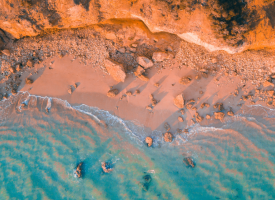Dr Bartone - GP-led Disaster and Emergency Planning, Smoke Haze, Measles Outbreak
Transcript: AMA President, Dr Tony Bartone, Sky News, 10 January 2020
Subjects: GP-led Disaster and Emergency Planning, Smoke Haze, Measles Outbreak
DANICA DE GIORGIO: Well, the Australian Medical Association is calling for local community GPs to be involved in future disaster and emergency planning to ensure primary healthcare is coordinated and ready when disasters like bushfires occur.
Joining me now live to discuss is Dr Tony Bartone, the President of the AMA. Doctor, thank you so much for your time this morning.
TONY BARTONE: Good morning, Danica.
DANICA DE GIORGIO: Firstly, what role could GPs play in disaster planning?
TONY BARTONE: Well, clearly, when we look at the scale, and the immense nature of the current disaster that's unfolding on our doorsteps in those bushfire-affected towns, we know that the GPs are part of the local community, they're respected, and trusted professionals in those communities, and people turn towards their trusted GP for advice, for help, for assistance, for counselling, for all sorts of interventions during this time. And clearly, part of the issue that we've clearly seen articulated from our members in those towns is the lack of coordination, and the lack of opportunity to have, be a meaningful part of that response. And, even their clinics are often being used as crisis care centres where people from town gravitate naturally to the clinics looking for answers, looking for help, looking for comfort, looking for reassurance and communication. And so, clearly, there is a central role for GPs at the front line to be involved in that response, and that requires proper planning and coordination from the outset so that everyone knows their place to play in the response to the crisis.
DANICA DE GIORGIO: Have there been issues over the last week or so, or when this bushfire crisis began, where GPs have actually been prevented from providing the care?
TONY BARTONE: We've had numerous reports from a number of our members, and from other GPs on the front line where they relay stories of quite disappointing opportunities being turned down to assist, to take part in that response. Not being part of the official accredited, the tags that go with the accreditation, to be part of that response, and people not being allowed to enter areas, to move about the town freely to access their patients, and the local community resources as required. So it's, yes, it has been quite distressing and disappointing.
DANICA DE GIORGIO: Let's talk about the smoke haze that we've seen blanketing a lot of the major cities over the last couple of months, particularly because of these bushfires. Are there any risks involved for people, particularly long term illnesses?
TONY BARTONE: So, what we’ve clearly been saying in this time is that if you don't need to be outdoors in that haze, in that smoke affected air - don't be. Clearly, if you've got respiratory conditions, if you have asthma, if you're pregnant, under-aged, small children, or elderly you clearly need to stay out, away from the outdoors, away from being directly affected. If you need to go outdoors, make sure you're wearing one of the approved masks, not the normal surgical or paper masks, they're totally useless in this kind of situation against the fine particle matter. One of those approved masks which, come with fitting instructions. Especially if you have respiratory conditions, have got cardiovascular conditions, you really must take all steps to stay away from the smoke haze, stay indoors, and away from that direct exposure as much as possible.
DANICA DE GIORGIO: Doctor, just on one final matter, measles has killed more than 6000 people in the Democratic Republic of Congo. There have been several outbreaks here in New South Wales, and in other parts of the country. Who is susceptible?
TONY BARTONE: Anyone who hasn't had two doses of vaccination, essentially, at the appropriate times, and hasn’t maintained that vaccination status over their lifetime. There is a natural cohort in our community of people who've grown up outside of Australia, who've come to Australia, they need to ensure that their immunisations are up-to-date. If you didn't have the immunisation as part of your normal schedule of vaccinations as a child, make sure you get them. There is a group of Australians born between 1966 and the early '90s, who may have only had the one dose, and of course that's starting to wane, and they're the people particularly susceptible to the effects of a circulating measles virus, which is very contagious, which, doesn't respect boundaries, and which we need to be more vigilant than ever before, especially with people who travel to these affected areas outside of Australia, and bring back the virus. This leads to the sporadic outbreaks that we continually see reported in the media, and in the front pages of our dailies.
DANICA DE GIORGIO: Dr Tony Bartone, thank you so much for your time this morning.
10 January 2020
CONTACT: John Flannery 02 6270 5477 / 0419 494 761



